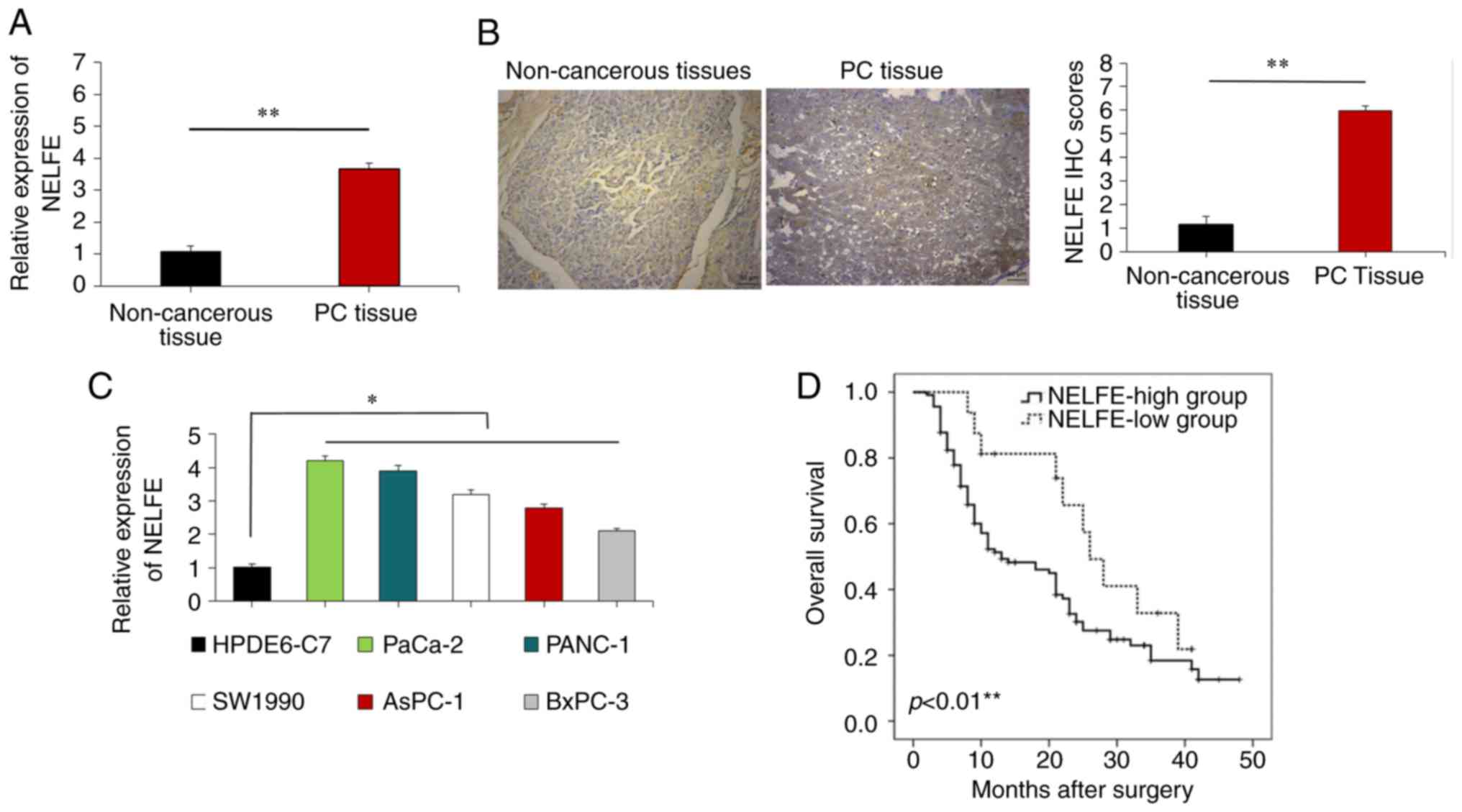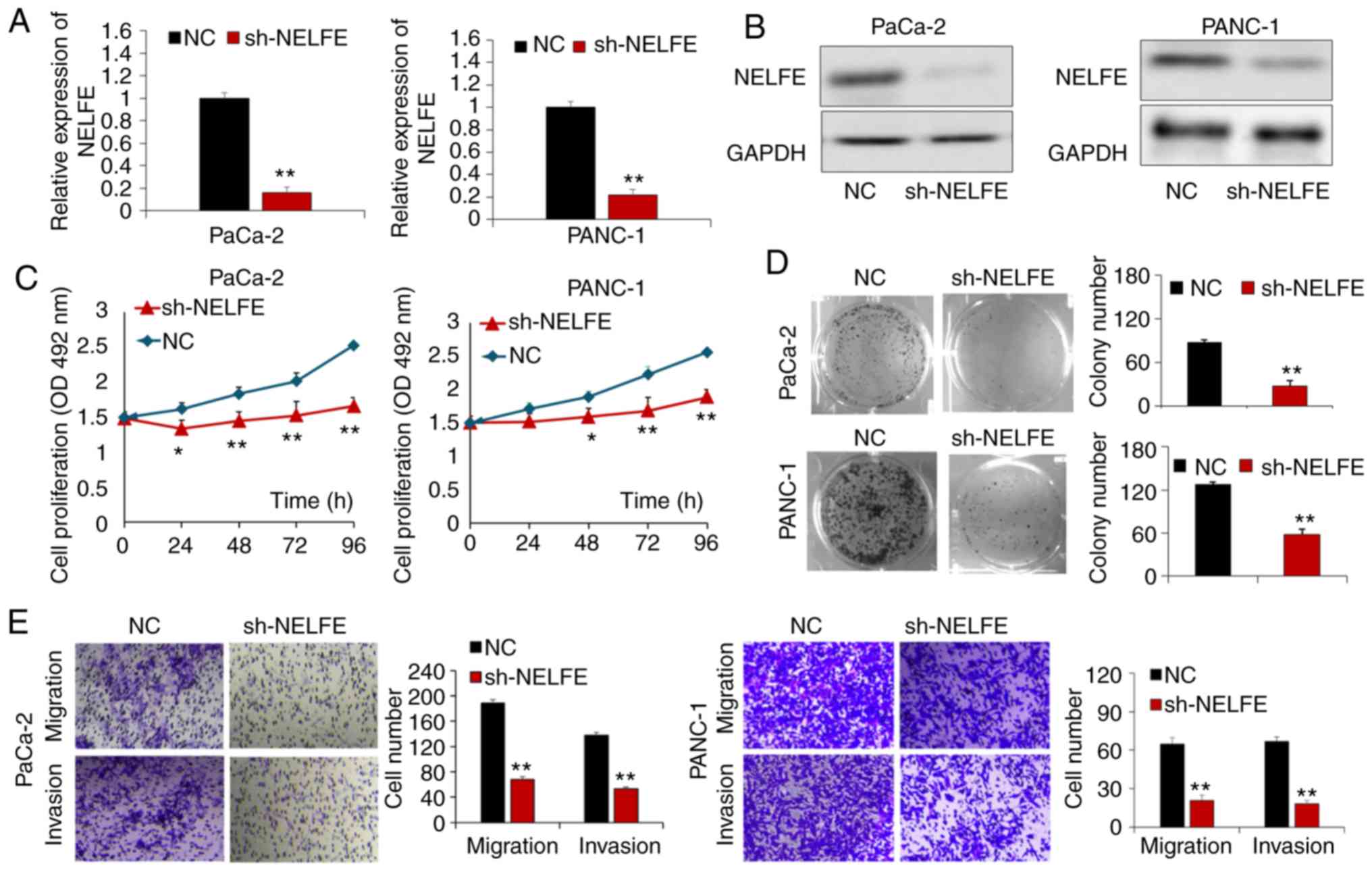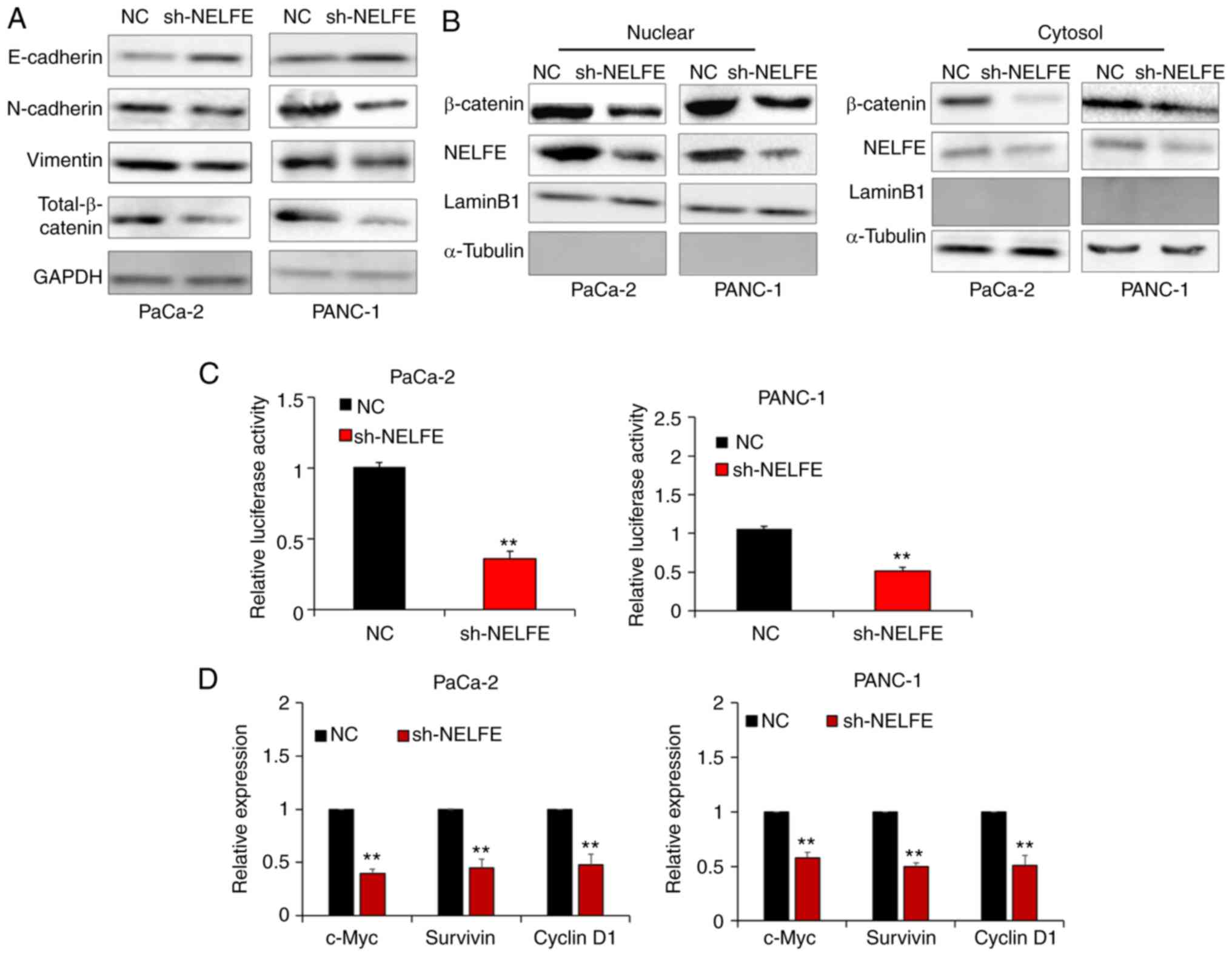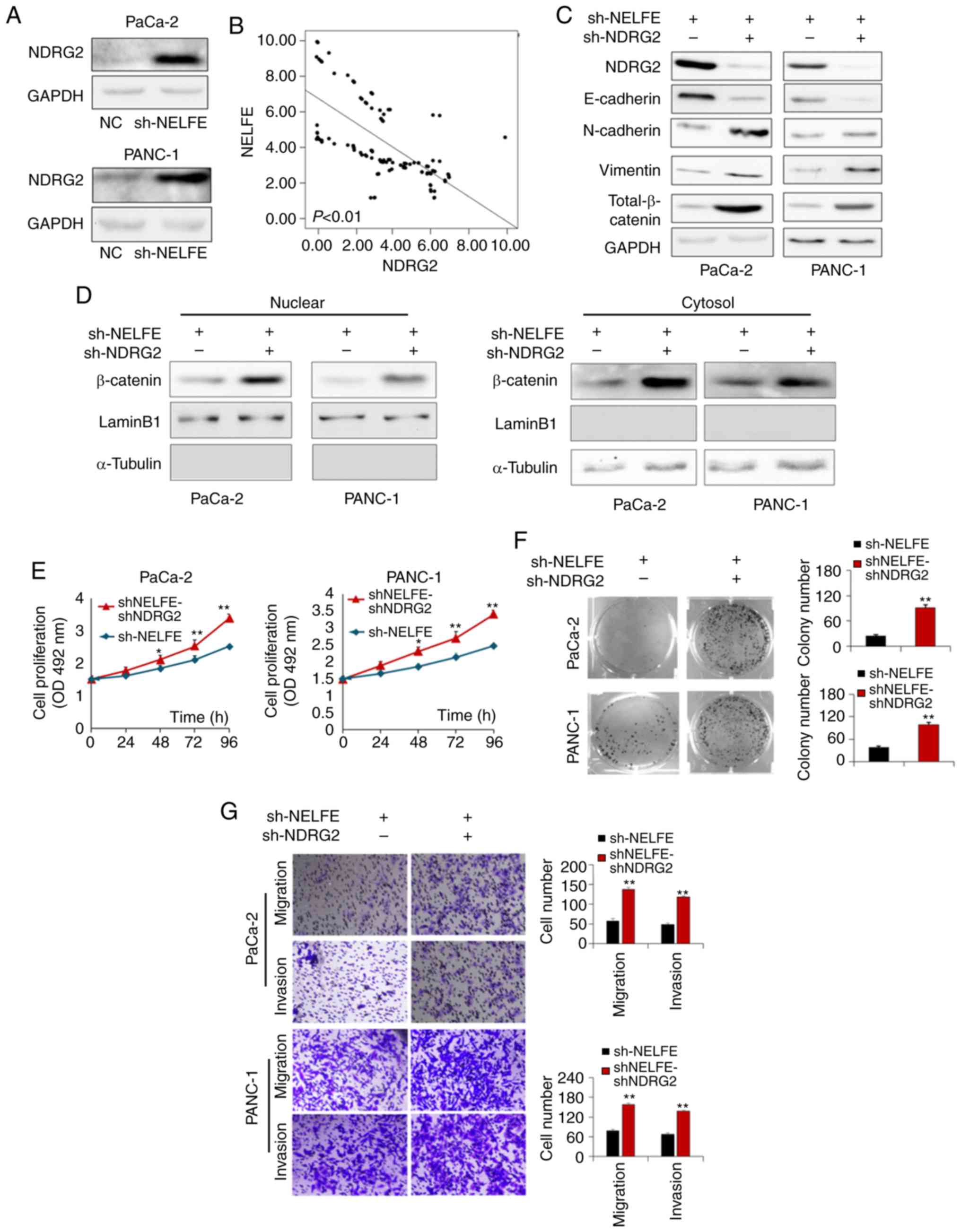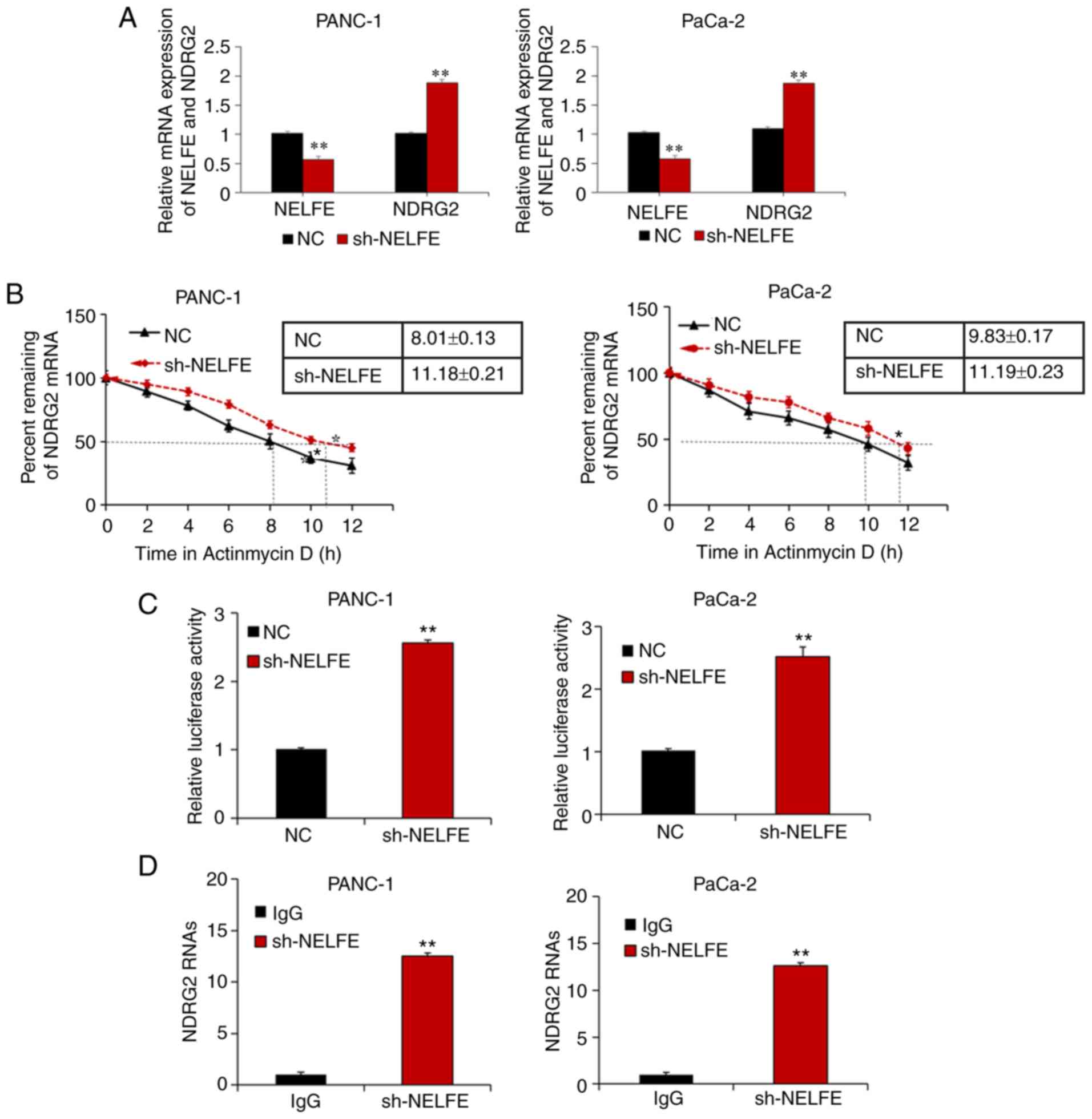|
1
|
Siegel RL, Miller KD and Jemal A: Cancer
statistics 2017. CA Cancer J Clin. 67:7–30. 2017. View Article : Google Scholar : PubMed/NCBI
|
|
2
|
Wang L, Yang GH, Li H and Lu XH: The
changing pancreatic cancer mortality in China (1991-2000). Zhonghua
Nei Ke Za Zhi. 44:509–513. 2005.In Chinese. PubMed/NCBI
|
|
3
|
Worni M, Guller U, White RR, Castleberry
AW, Pietrobon R, Cerny T, Gloor B and Koeberle D: Modest
improvement in overall survival for patients with metastatic
pancreatic cancer: A trend analysis using the surveillance,
epidemiology, and end results registry from 1988 to 2008. Pancreas.
42:1157–1163. 2013. View Article : Google Scholar : PubMed/NCBI
|
|
4
|
Nieto MA, Huang RY, Jackson RA and Thiery
JP: EMT: 2016. Cell. 166:21–45. 2016. View Article : Google Scholar : PubMed/NCBI
|
|
5
|
Giannelli G, Koudelkova P, Dituri F and
Mikulits W: Role of epithelial to mesenchymal transition in
hepatocellular carcinoma. J Hepatol. 65:798–808. 2016. View Article : Google Scholar : PubMed/NCBI
|
|
6
|
Gonzalez DM and Medici D: Signaling
mechanisms of the epithelial-mesenchymal transition. Sci Signal.
7:re82014. View Article : Google Scholar : PubMed/NCBI
|
|
7
|
Lee JM, Dedhar S, Kalluri R and Thompson
EW: The epithelial-mesenchymal transition: New insights in
signaling, development, and disease. J Cell Biol. 172:973–981.
2006. View Article : Google Scholar : PubMed/NCBI
|
|
8
|
Scaturrok M, Sala A, Cutrona G, Raimondi
L, Cannino G, Fontana S, Pucci-Minafra I and Di Liegro I:
Purification by affinity chromatography of H1o RNA-binding proteins
from rat brain. Int J Mol Med. 11:509–513. 2003.PubMed/NCBI
|
|
9
|
Roesch A, Becker B, Meyer S, Wild P,
Hafner C, Landthaler M and Vogt T: Retinoblastoma-binding protein
2-homolog 1: A retinoblastoma-binding protein downregulated in
malignant melanomas. Mod Pathol. 18:1249–1257. 2005. View Article : Google Scholar : PubMed/NCBI
|
|
10
|
Hodson DJ, Screen M and Turner M: RNA
binding proteins in hematopoiesis and hematological malignancy.
Blood. 133:2365–2373. 2019. View Article : Google Scholar : PubMed/NCBI
|
|
11
|
Hentze MW, Castello A, Schwarzl T and
Preiss T: A brave new world of RNA-binding proteins. Nat Rev Mol
Cell Biol. 19:327–341. 2018. View Article : Google Scholar : PubMed/NCBI
|
|
12
|
Narita T, Yung TM, Yamamoto J, Tsuboi Y,
Tanabe H, Tanaka K, Yamaguchi Y and Handa H: NELF interacts with
CBC and participates in 3′ end processing of replication-dependent
histone rnRNAs. Mol Cell. 26:349–365. 2007. View Article : Google Scholar : PubMed/NCBI
|
|
13
|
Dang H, Takai A, Forgues M, Pomyen Y, Mou
H, Xue W, Ray D, Ha KCH, Morris QD, Hughes TR and Wang XW:
Oncogenic activation of the RNA binding protein NELFE and MYC
signaling in hepatocellular carcinoma. Cancer Cell. 32:101–114.e8.
2017. View Article : Google Scholar : PubMed/NCBI
|
|
14
|
Han LL, Nan HC, Tian T, Guo H, Hu TH, Wang
WJ, Ma JQ, Jiang LL, Guo QQ, Yang CC, et al: Expression and
significance of the novel tumor-suppressor gene SMG-1 in
hepatocellular carcinoma. Oncol Rep. 31:2569–2578. 2014. View Article : Google Scholar : PubMed/NCBI
|
|
15
|
Livak KJ and Schmittgen TD: Analysis of
relative gene expression data using real-time quantitative PCR and
the 2(-Delta Delta C (T)) method. Methods. 25:402–408. 2001.
View Article : Google Scholar
|
|
16
|
Liu L, Xu HX, He M, Wang W, Wang WQ, Wu
CT, Wei RQ, Liang Y, Gao HL, Liu C, et al: A novel scoring system
predicts postsurgical survival and adjuvant chemotherapeutic
benefits in patients with pancreatic adenocarcinoma: Implications
for AJCC-TNM staging. Surgery. 163:1280–1294. 2018. View Article : Google Scholar : PubMed/NCBI
|
|
17
|
Zhou P, Li Y, Li B, Zhang M, Liu Y, Yao Y
and Li D: NMIIA promotes tumor growth and metastasis by activating
the Wnt/β-catenin signaling pathway and EMT in pancreatic cancer.
Oncogene. 38:5500–5515. 2019. View Article : Google Scholar : PubMed/NCBI
|
|
18
|
Tian X, Liu Z, Niu B, Zhang J, Tan TK, Lee
SR, Zhao Y, Harris DC and Zheng G: Ecadherin/β-catenin complex and
the epithelial barrier. J Biomed Biotechnol. 2011:5673052011.
View Article : Google Scholar
|
|
19
|
Lorentzen A, Vogel LK, Lewinsky RH, Saebø
M, Skjelbred CF, Godiksen S, Hoff G, Tveit KM, Lothe IM, Ikdahl T,
et al: Expression of NDRG2 is down-regulated in high-risk adenomas
and colorectal carcinoma. BMC Cancer. 7:1922007. View Article : Google Scholar : PubMed/NCBI
|
|
20
|
Kang K, Nam S, Kim B, Lim JH, Yang Y, Lee
MS and Lim JS: Inhibition of osteoclast differentiation by
overexpression of NDRG2 in monocytes. Biochem Biophys Res Commun.
468:611–616. 2015. View Article : Google Scholar : PubMed/NCBI
|
|
21
|
Zhang J, Li F, Liu X, Shen L, Liu J, Su J,
Zhang W, Deng Y, Wang L, Liu N, et al: The repression of human
differentiation-related gene NDRG2 expression by Myc via
Miz-1-dependent interaction with the NDRG2 core promoter. J Biol
Chem. 281:39159–39168. 2006. View Article : Google Scholar : PubMed/NCBI
|
|
22
|
Hu XL, Liu XP, Lin SX, Deng YC, Liu N, Li
X and Yao LB: NDRG2 expression and mutation in human liver and
pancreatic cancers. World J Gastroenterol. 10:3518–3521. 2004.
View Article : Google Scholar : PubMed/NCBI
|
|
23
|
Yamaguchi Y, Takagi T, Wada T, Yano K,
Furuya A, Sugimoto S, Hasegawa J and Handa H: NELF, a multisubunit
complex containing RD, cooperates with DSIF to repress RNA
polymerase II elongation. Cell. 97:41–51. 1999. View Article : Google Scholar : PubMed/NCBI
|
|
24
|
Vos SM, Pöllmann D, Caizzi L, Hofmann KB,
Rombaut P, Zimniak T, Herzog F and Cramer P: Architecture and RNA
binding of the human negative elongation factor. Elife.
5:e149812016. View Article : Google Scholar : PubMed/NCBI
|
|
25
|
Price DH: Regulation of RNA polymerase II
elongation by c-Myc. Cell. 141:399–400. 2010. View Article : Google Scholar : PubMed/NCBI
|
|
26
|
Midorikawa Y, Tsutsumi S, Taniguchi H,
Ishii M, Kobune Y, Kodama T, Makuuchi M and Aburatani H:
Identification of genes associated with dedifferentiation of
hepatocellular carcinoma with expression profiling analysis. Jpn J
Cancer Res. 93:636–643. 2002. View Article : Google Scholar : PubMed/NCBI
|
|
27
|
McChesney PA, Aiyar SE, Lee OJ, Zaika A,
Moskaluk C, Li R and El-Rifai W: Cofactor of BRCA1: A novel
transcription factor regulator in upper gastrointestinal
adenocarcinomas. Cancer Res. 66:1346–1353. 2006. View Article : Google Scholar : PubMed/NCBI
|
|
28
|
Wu CH, Lee C, Fan R, Smith MJ, Yamaguchi
Y, Handa H and Gilmour DS: Molecular characterization of Drosophila
NELF. Nucleic Acids Res. 33:1269–1279. 2005. View Article : Google Scholar : PubMed/NCBI
|
|
29
|
Sun J, Watkins G, Blair AL, Moskaluk C,
Ghosh S, Jiang WG and Li R: Deregulation of cofactor of BRCA1
expression in breast cancer cells. J Cell Biochem. 103:1798–1807.
2008. View Article : Google Scholar
|
|
30
|
Thiery JP and Sleeman JP: Complex networks
orchestrate epithelial-mesenchymal transitions. Nat Rev Mol Cell
Biol. 7:131–142. 2006. View
Article : Google Scholar : PubMed/NCBI
|
|
31
|
Cui W, Meng W, Zhao L, Cao H, Chi W and
Wang B: TGF-β-induced long non-coding RNA MIR155HG promotes the
progression and EMT of laryngeal squamous cell carcinoma by
regulating the miR-155-5p/SOX10 axis. Int J Oncol. 54:2005–2018.
2019.PubMed/NCBI
|
|
32
|
Nie J, Jiang HC, Zhou YC, Jiang B, He WJ,
Wang YF and Dong J: MiR-125b regulates the proliferation and
metastasis of triple negative breast cancer cells via the
Wnt/β-catenin pathway and EMT. Biosci Biotechnol Biochem.
83:1062–1071. 2019. View Article : Google Scholar : PubMed/NCBI
|
|
33
|
Zhang HG, Pan YW, Feng J, Zeng CT, Zhao
XQ, Liang B and Zhang WW: TRIM66 promotes malignant progression of
hepatocellular carcinoma by inhibiting E-cadherin expression
through the EMT pathway. Eur Rev Med Pharmacol Sci. 23:2003–2012.
2019.PubMed/NCBI
|
|
34
|
Nam Y, Weng AP, Aster JC and Blacklow SC:
Structural requirements for assembly of the CSL.intracellular
Notch1. Mastermind-like 1 transcriptional activation complex. J
Biol Chem. 278:21232–21239. 2003. View Article : Google Scholar : PubMed/NCBI
|
|
35
|
Peng G and Liu Y: Hypoxia-inducible
factors in cancer stem cells and inflammation. Trends Pharmacol
Sci. 36:374–383. 2015. View Article : Google Scholar : PubMed/NCBI
|
|
36
|
Oh SJ, Shin JH, Kim TH, Lee HS, Yoo JY,
Ahn JY, Broaddus RR, Taketo MM, Lydon JP, Leach RE, et al:
β-Catenin activation contributes to the pathogenesis of adenomyosis
through epithelial-mesenchymal transition. J Pathol. 231:210–222.
2013. View Article : Google Scholar : PubMed/NCBI
|
|
37
|
Kechavarzi B and Janga SC: Dissecting the
expression landscape of RNA-binding proteins in human cancers.
Genome Biol. 15:R142014. View Article : Google Scholar : PubMed/NCBI
|
|
38
|
Gerstberger S, Hafner M and Tuschl T: A
census of human RNA-binding proteins. Nat Rev Genet. 15:829–845.
2014. View Article : Google Scholar : PubMed/NCBI
|
|
39
|
Galante PA, Sandhu D, de Sousa Abreu R,
Gradassi M, Slager N, Vogel C, de Souza SJ and Penalva LO: A
comprehensive in silico expression analysis of RNA binding proteins
in normal and tumor tissue: Identification of potential players in
tumor formation. RNA Biol. 6:426–433. 2009. View Article : Google Scholar : PubMed/NCBI
|
|
40
|
Adelman K and Lis JT: Promoter-proximal
pausing of RNA polymerase II: Emerging roles in metazoans. Nat Rev
Genet. 13:720–731. 2012. View Article : Google Scholar : PubMed/NCBI
|
|
41
|
Li J, Liu Y, Rhee HS, Ghosh SK, Bai L,
Pugh BF and Gilmour DS: Kinetic competition between elongation rate
and binding of NELF controls promoter proximal pausing. Mol Cell.
50:711–722. 2013. View Article : Google Scholar : PubMed/NCBI
|
|
42
|
Pagano JM, Kwak H, Waters CT, Sprouse RO,
White BS, Ozer A, Szeto K, Shalloway D, Craighead HG and Lis JT:
Defining NELF-E RNA binding in HIV-1 and promoter-proximal pause
regions. PLoS Genet. 10:e10040902014. View Article : Google Scholar : PubMed/NCBI
|
|
43
|
Dang H, Pomyen Y, Martin SP, Dominguez DA,
Yim SY, Lee JS, Budhu A, Shah AP, Bodzin AS and Wang XW:
NELFE-dependent MYC signature identifies a unique cancer subtype in
hepatocellular carcinoma. Sci Rep. 9:33692019. View Article : Google Scholar : PubMed/NCBI
|
|
44
|
Deng Y, Yao L, Chau L, Ng SS, Peng Y, Liu
X, Au WS, Wang J, Li F, Ji S, et al: N-Myc downstream-regulated
gene 2 (NDRG2) inhibits glioblastoma cell proliferation. Int J
Cancer. 106:342–347. 2003. View Article : Google Scholar : PubMed/NCBI
|
|
45
|
Chen XL, Lei L, Hong LL and Ling ZQ:
Potential role of NDRG2 in reprogramming cancer metabolism and
epithelial-to-mesenchymal transition. Histol Histopathol.
33:655–663. 2018.
|
|
46
|
Kim MJ, Lim J, Yang Y, Lee MS and Lim JS:
N-myc downstream-regulated gene 2 (NDRG2) suppresses the
epithelial-mesenchymal transition (EMT) in breast cancer cells via
STAT3/Snail signaling. Cancer Lett. 354:33–42. 2014. View Article : Google Scholar : PubMed/NCBI
|
|
47
|
Moradi Monfared M, Alizadeh Zarei M,
Rafiei Dehbidi G, Behzad Behbahani A, Arabsolghar R and Takhshid
MA: NDRG2 regulates the expression of genes involved in epithelial
mesenchymal transition of prostate cancer cells. Iran J Med Sci.
44:118–126. 2019.PubMed/NCBI
|
|
48
|
Yang CL, Zheng XL, Ye K, Ge H, Sun YN, Lu
YF and Fan QX: NDRG2 suppresses proliferation, migration, invasion
and epithelial-mesenchymal transition of esophageal cancer cells
through regulating the AKT/XIAP signaling pathway. Int J Biochem
Cell Biol. 99:43–51. 2018. View Article : Google Scholar : PubMed/NCBI
|
|
49
|
Kim YJ, Yoon SY, Kim JT, Song EY, Lee HG,
Son HJ, Kim SY, Cho D, Choi I, Kim JH and Kim JW: NDRG2 expression
decreases with tumor stages and regulates TCF/beta-catenin
signaling in human colon carcinoma. Carcinogenesis. 30:598–605.
2009. View Article : Google Scholar : PubMed/NCBI
|
|
50
|
Xu X, Li J, Sun X, Guo Y, Chu D, Wei L, Li
X, Yang G, Liu X, Yao L, et al: Tumor suppressor NDRG2 inhibits
glycolysis and glutaminolysis in colorectal cancer cells by
repressing c-Myc expression. Oncotarget. 6:26161–26176. 2015.
View Article : Google Scholar : PubMed/NCBI
|















